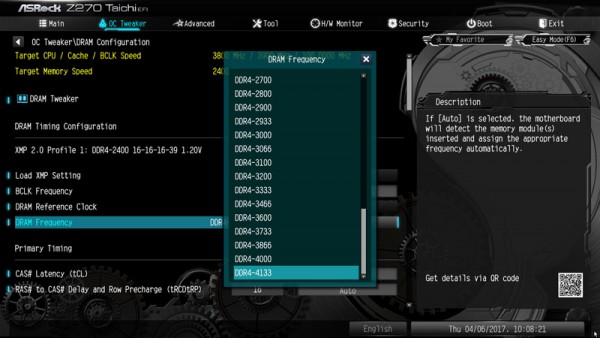
BIOS and Overclocking …
Get fast to the right UEFI settings …
BIOS and Overclocking
UEFI BIOS Update
ASRock Z270 Taichi overclocking
ASRock Z270 Taichi memory settings
ASRock Z270 Taichi voltage settings
Overclock even easier
BIOS undervolting
Fan control
BIOS and overclocking …
Let us continue with the BIOS / UEFI Setup options and the UEFI overclocking. By pressing F2 or Del during PC boot, you get access to the UEFI Setup.
The ASRock Z270 Taichi UEFI has a graphical interface that allows intuitive operation with the mouse, or can be operated still as usual with a keyboard.
For beginners there is the ASRock EZ Mode – so Easy Mode, an entry page with most important information and is still not looking overloaded. It offers basic information such as time, date, CPU temperature, motherboard temperature, CPU voltage, first details about the hardware, fan speeds, as well as an adjustment of the fan with one click.
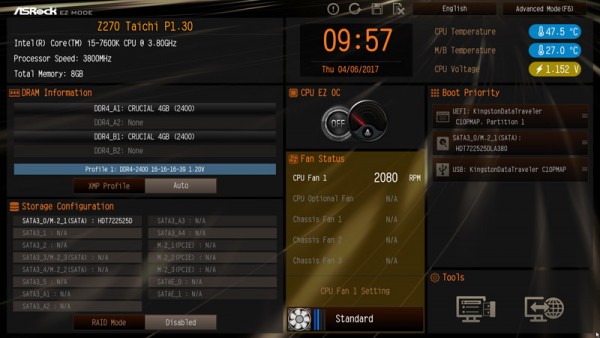
Also, some applications were grouped together in a tools page.
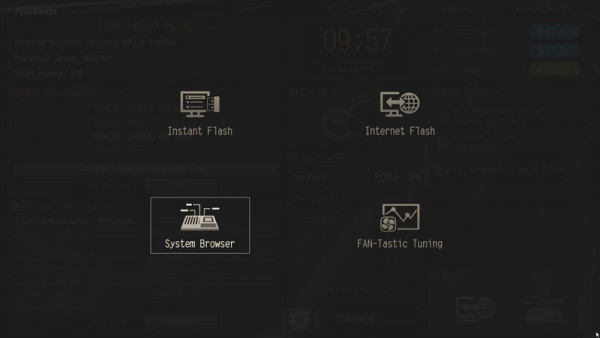
Who like to see more details about the installed hardware, there is also the System Browser view, where you can view graphically which components are installed in the PC.
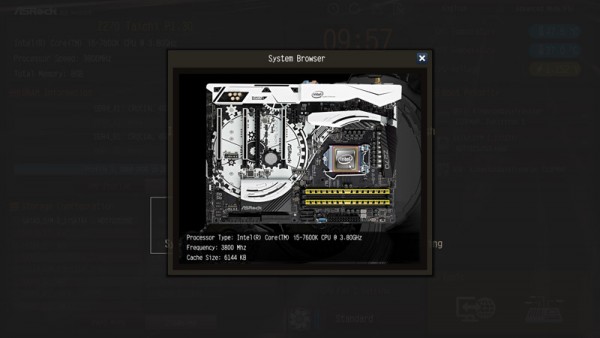
With a click on the component you can get more information and with a click on the I/O panel you can see the installed devices of each port.
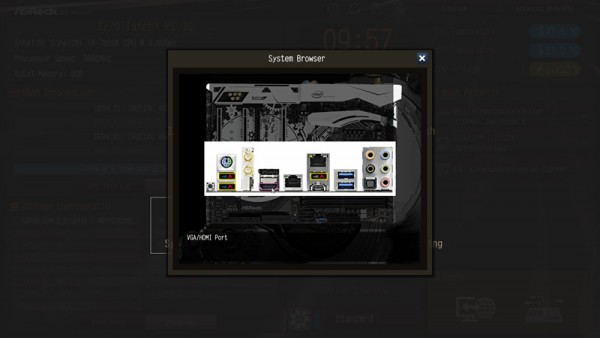
Of course, you can also set the time and date over the EZ menu.
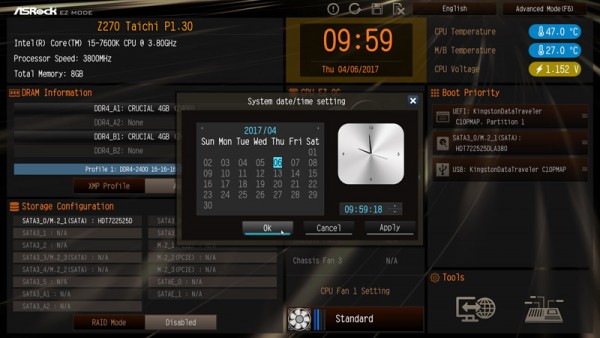
More functions can be activated with keyboard shortcuts or using the F-keys.
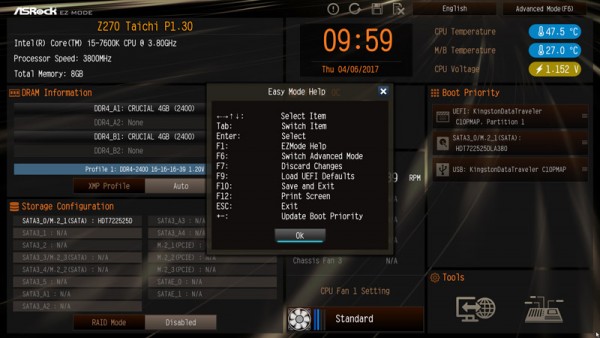
With the F6 key you can get back to the ASRock advanced mode after a short confirm, which you can also set as standard option. Overclockers start probably already with the Advanced mode or directly with the Tweaker menu or the favorite menu.
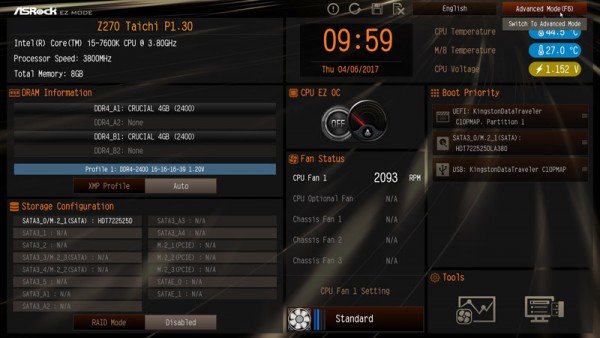
In Advanced Mode you can see at the first screen the UEFI version, the CPU used, the installed DDR4 memory with dual channel support, a language selection and the My Favorite menu item.
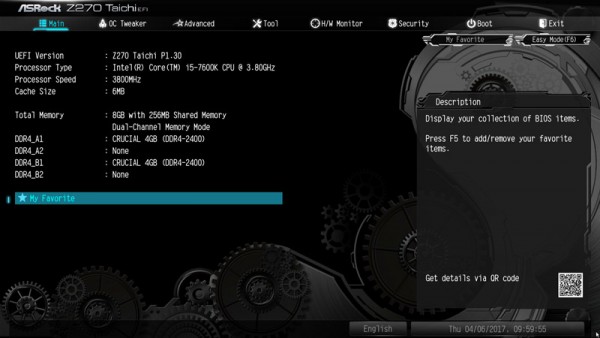
The My Favorite feature is very useful, because you can add here often needed menu items. You start with a blank page – it’s also blank after a BIOS update.
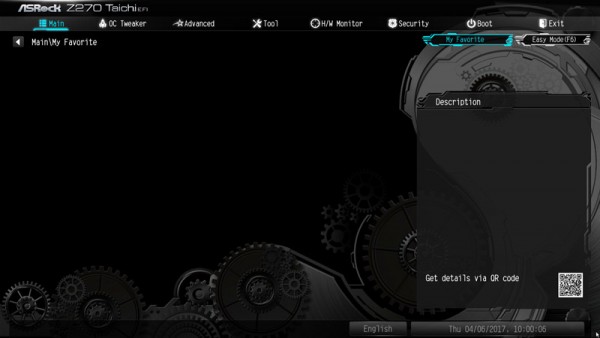
Simply select the desired menu item, then press F5 and the feature is added or removed from the my favorite overview page. Here you can see a selection of possible favorites.
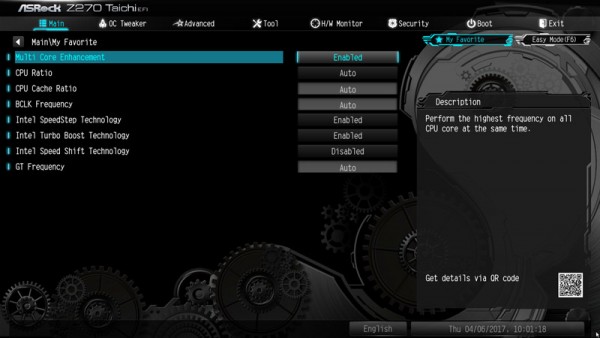
The Z270 motherboard has a selection to view the UEFI in Full HD and also offers the Active Page on Entry selection, where you can decide which UEFI page you want to see when you enter the UEFI Setup. This is very helpful mainly for overclocking, since one have to enter the second OC Tweaker menu very often to find the best OC settings. Or you just add all necessary points to the My Favorite overview and start directly to the My Favorite overview page. At the ASRock Z270 Taichi you find the Active Page on Entry option and the Full HD UEFI selection now in Advanced.
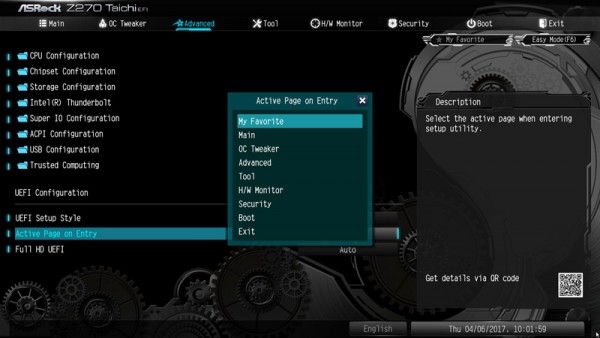
UEFI BIOS Update …
Before we begin with the UEFI overclocking settings, we first update the UEFI BIOS to the latest version. To flash the UEFI update ASRock offers some possibilities, e.g. the very simple Instant Flash or the ASRock Internet Flash with a direct connection to the Internet. By the so-called ASRock Instant Flash option in the tool screen or via F6 during PC start you get into the ASRock Instant Flash utility. You can easily flash a previously downloaded ASRock BIOS without a boot CD or similar by simply starting the ASRock Instant Flash utility. Just select the BIOS Flash ROM from the desired drive, like an USB stick.
This time we’ve selected the ASRock Internet Flash option to check if and which UEFI is available. The board was already supplied with the BIOS P1.30. At testing date, the UEFI BIOS version P1.30 was available as latest download. Usually you confirm the UEFI update and the new UEFI will be updated.
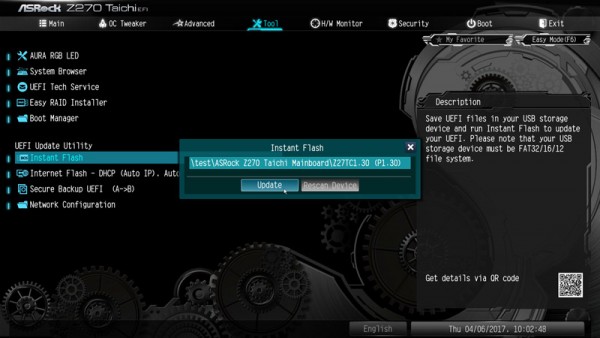
The new UEFI version is available after a restart and can be checked directly on the entry page.
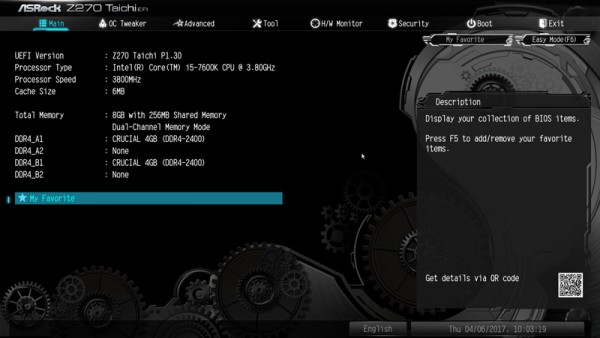
On the Tools page, a completely new point is located and this is called AURA RGB LED.
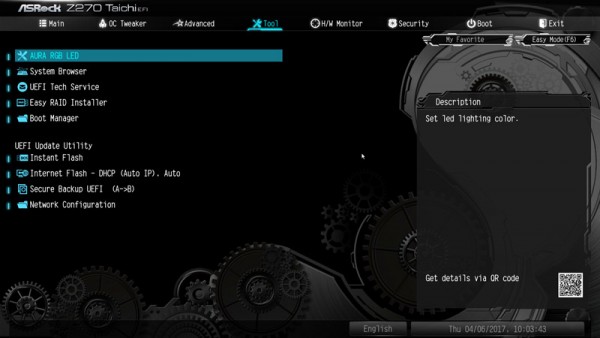
The AURA RGB LED menu has many settings. In addition, you can select the color in a RGB color picker.
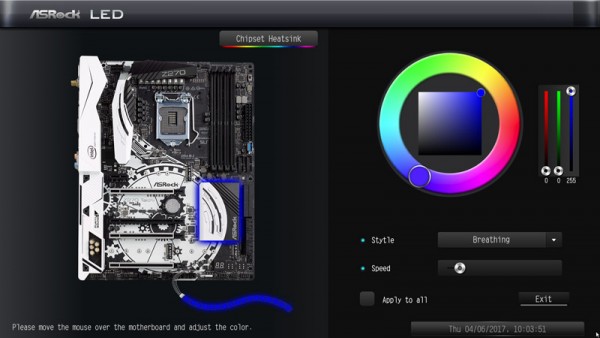
You can select, if you like to control the RGB header separately or together with the RGB lighting under the chipset cooler.
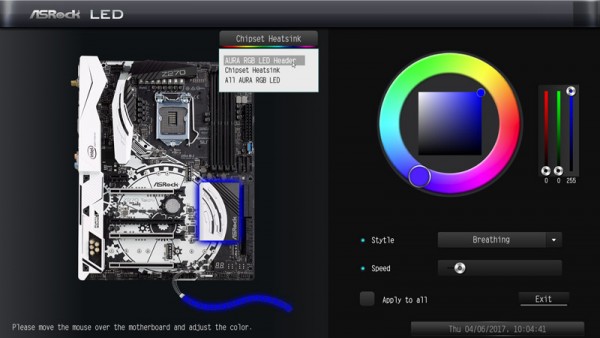
And you can adjust in the AURA RGB LED menu, if the LEDs should light continuously, “breathe”, random or even light up to the music. The user has numerous ways how and how fast light up the LED stripes or the chipset cooler LEDs and can of course also completely disable it. Certainly as already mentioned in the previous ASRock Z270 Killer review, it’s no “must have” feature, but definitely “nice to have”!
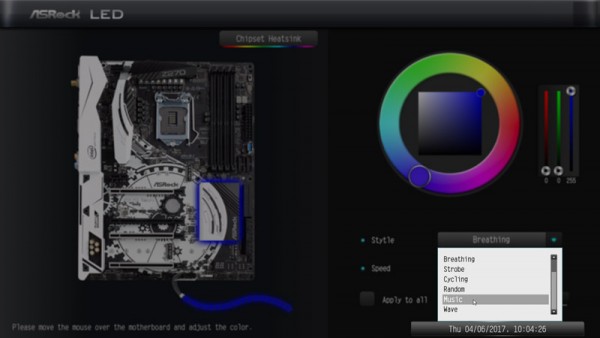
If you need technical UEFI support, you can now even contact the ASRock Tech Service over the UEFI setup and a network connection.
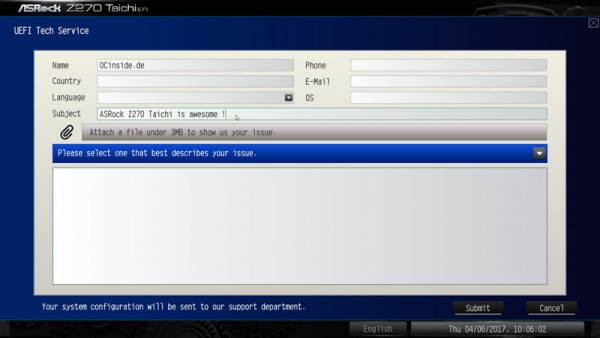
On the tool page, you can find by the way a system browser view, where you can graphically see all installed components.
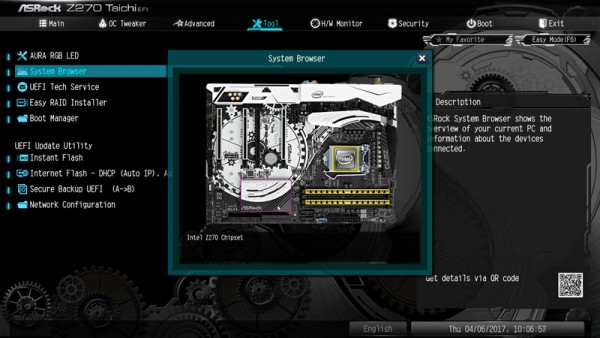
OMG – the Online Management Guard to restrict online time access by the way is no more available.
ASRock Z270 Taichi overclocking …
ASRock split the OC-Tweaker settings for this ASRock Z270 Taichi in CPU Configuration, DRAM Configuration and Voltage Configuration.
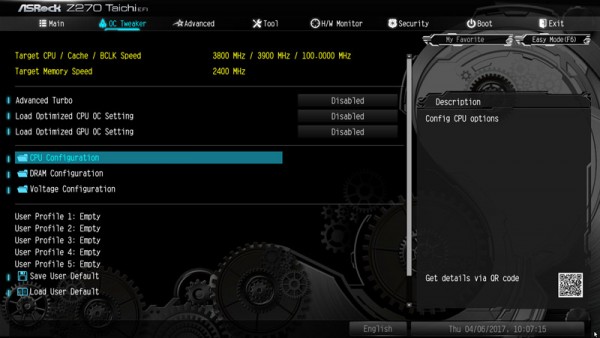
A look at the CPU configuration shows many OC options for the Intel LGA1151 CPU overclocking.
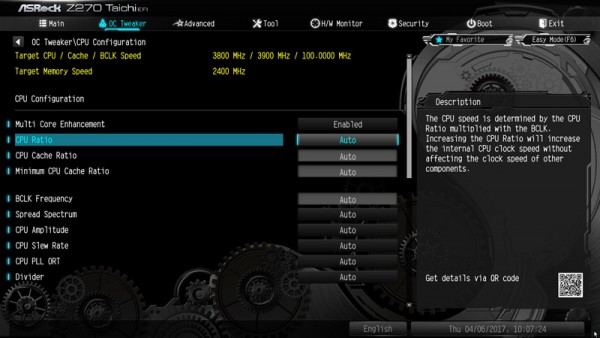
Thanks to the extra Hyper BCLK Engine II clock generator the BCLK/PCIE frequency is available from 90 MHz up to legendary 1000 MHz. This frequency is very important for a lot of frequency values also with Intel LGA1151 processors, which can get quickly too high. For this reason, you should carefully increase the BCLK host clock.
In our tests the board could be stable overclocked to 290 MHz !!! BCLK ! New record on HWBot !
The Intel “K” CPUs have an unlocked multiplier, so one can overclock the CPU frequency very extensively over the CPU multiplier. With a 7600K CPU (default clock 3800 MHz with a CPU ratio of 38x), the ASRock Z270 Taichi motherboard offered a multiplier range from 8x to 120x. In addition to the CPU ratio and BCLK settings there of course many more settings.
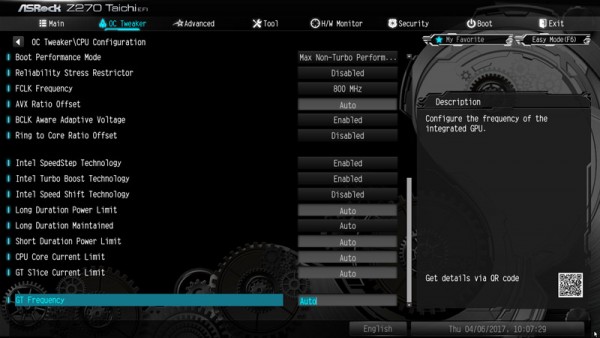
ASRock Z270 Taichi memory settings …
Im DRAM Configuration Menu findet man alle wichtigen Speicher Einstellungen.
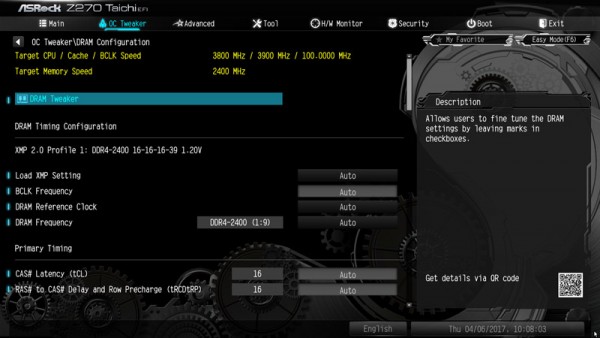
Thanks to XMP support, XMP memory modules can be set correctly by the XMP switch or with one mouse click in the UEFI by selecting the desired profile in the DRAM configuration.
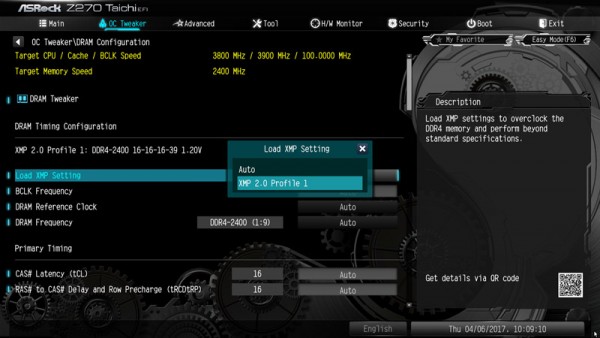
For DDR4 memory, there are settings like e.g. the memory frequency from DDR4-800 …
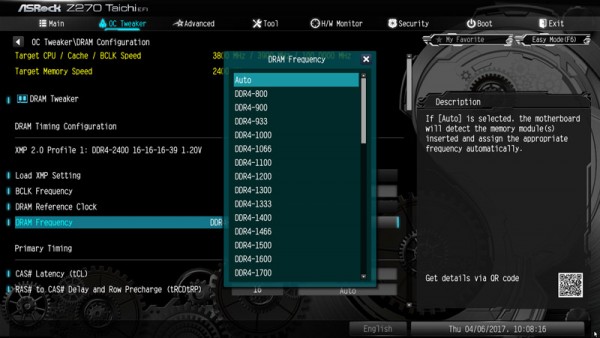
With manual BCLK overclocking and the correct RAM modules, significantly higher memory clock rates are possible. The frequency of all memory modules is calculated and displayed after changing the reference clock to make it much easier adjusting to the right RAM frequency.
Optionally you can manually adjust all DDR4 timings:
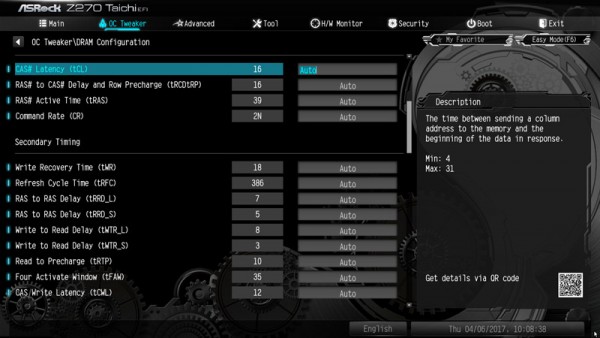
The ASRock Z270 Taichi offers a DRAM Tweaker menu and an overview of all SPD and XMP values to select them directly.
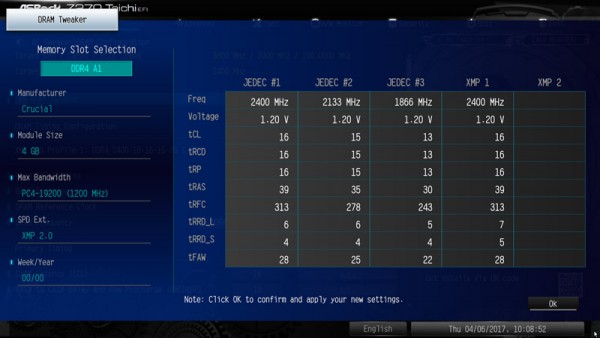
ASRock Z270 Taichi voltage settings …
Now we come to the voltage settings that can be adjusted in the UEFI.
For Z270 the voltage settings are found in Voltage Configuration and not like Intel X299 separated in FIVR Configuration and Voltage Configuration.
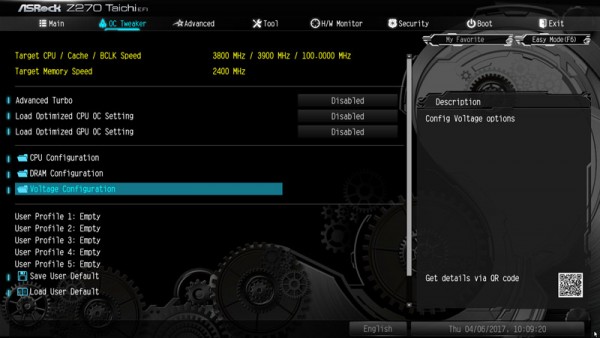
Here are the settings for the voltage configuration.
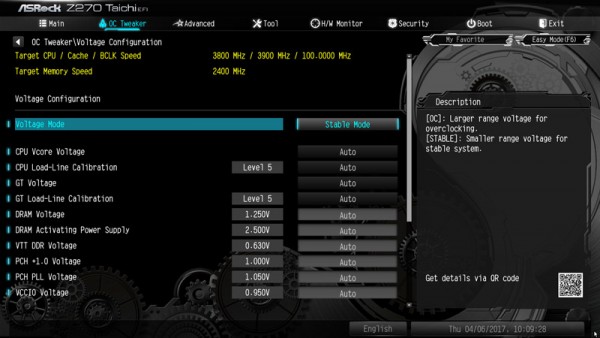
The motherboard offers many voltage settings, like for example a VCore selection with the Intel Core i5-7600K Test CPU from 0.900 Volt to 1.500 Volt and -0.100 to +0.500 Offset, PCH +1.0V Voltage 0.900 to 1.300V, PCH PLL Voltage 0.875 to 1.295V, VCCIO Voltage 0.850 to 1.400V, Boot CPU PLL Voltage 0.910 to 1.599V, Eventual CPU PLL Voltage 0.910 to 1.599V, VCC PLL Voltage 1.100 to 1.800V, CPU Cold Bug Killer Voltage 0.910 to 1.599V, CLK VDD Voltage 1.034 to 3,478V, DMI Voltage 0.910 to 1.391V, CPU Internal PLL Voltage 0.900 to 1.155 Volt, CPU Core Current Limit, GT Slice Current Limit, Short Duration Power Limit, Long Duration Power Limit, Long Duration Maintained and CPU Load Line Calibration 1 to 4 being high overclocking settings for the Intel Kaby Lake CPU.
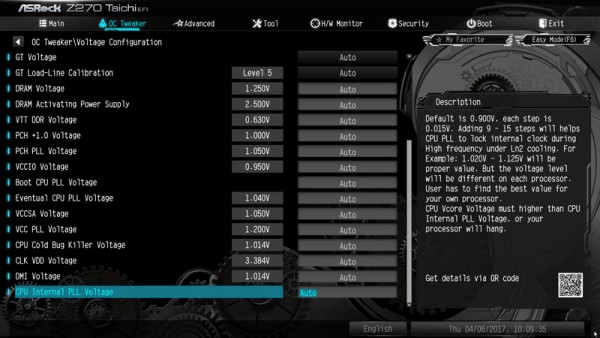
The DDR4 voltage could be increased as seen above, between 1.000 and 1.800 Volt, DRAM Activating Power Supply 2.500 to 2.700V and VTT DDR Voltage 0.500 to 1.000V for high DDR4 memory overclocking or undervolting.
ASRock Z270 Taichi even easier overclocking …
If you do not like to get deeper inside of overclocking, you can overclock either by the Load Optimized CPU OC Setting to try overclocking with predefined OC settings. It can increase the system performance automatically by overclocking in different Turbo steps – at least with some luck and if it is possible with your processor. Simply select the desired Optimized CPU OC setting, then some components and the CPU are overclocked, e.g. to Turbo 4.4 GHz, Turbo 4.5 GHz, Turbo 4.6 GHz, Turbo 4.7 GHz or Turbo 4.8 GHz – overclocking could not be easier!
Here you can see the Load Optimized CPU OC Settings for the Intel Kaby Lake 7600K CPU:
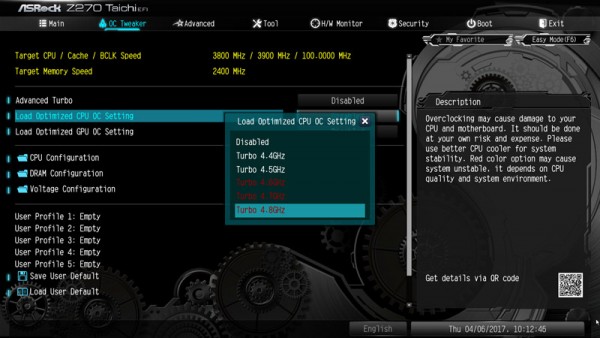
Who rather would like to overclock in Windows, can make many of the above voltage and frequency settings even with the ASRock A-Tuning tool.
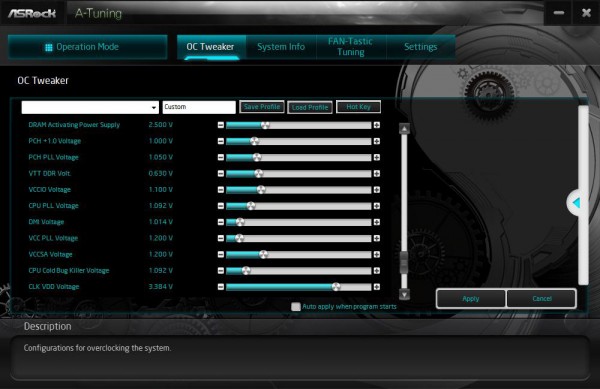
Highest overclocking should set manually for each value, to be able adjusting all values in detail for the installed hardware. We give you overclocking help in our PC Forum (German and English OC forums available).
Once the desired settings are found, you can save up to five different OC Tweaker BIOS settings with names in the UEFI. For example, you can save balanced BIOS settings, overclocking settings and undervolting settings or Office and Gaming settings in an user profile of the UEFI to load them very quickly at any time.
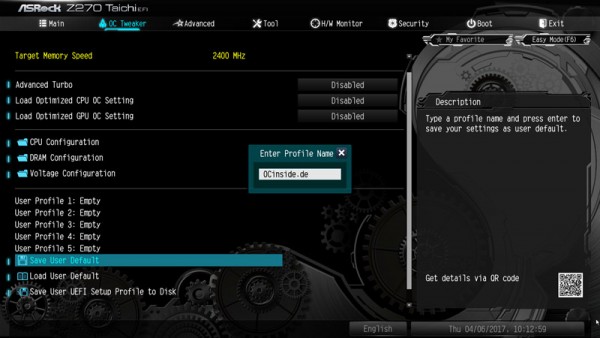
Interesting is the new Save User UEFI Setup Profile to Disk option. Just click it to save your own UEFI settings on the hard drive or an USB stick.
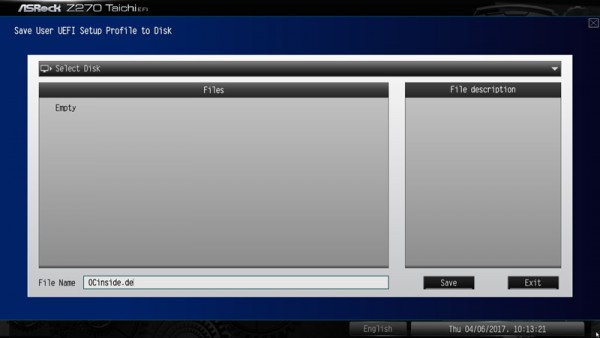
BIOS Undervolting …
The downclocking or underclocking is also tested in this review. It was possible to lower the Intel Core-i5-7600K CPU multiplier over the BIOS to 8x to underclock the processor with 100 MHz BCLK to approx. 800 MHz. Of course, underclocking is like overclocking outside of the manufacturers specification, so it is necessary to have some luck. ASRock gives several options for easy PC underclocking / downclocking.
Of course there are more UEFI settings like CPU, Chipset, Storage, Intel Thunderbolt, Super IO, ACPI, USB Configuration and Trusted Computing setup.
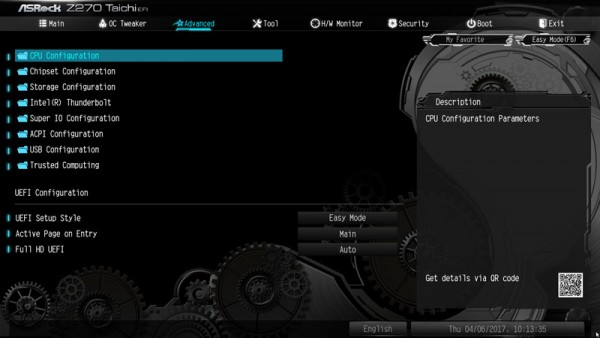
If you want to save energy consumption of the Intel PC, you should check all settings in the CPU configuration menu under Advanced.
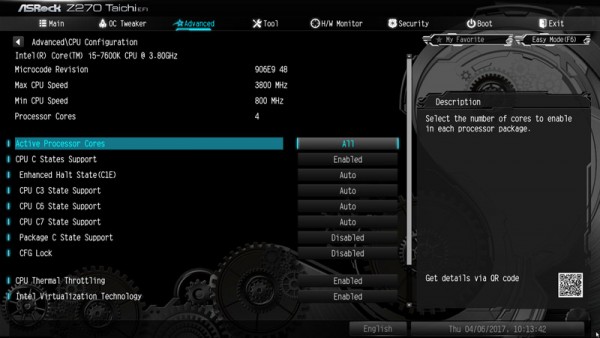
But also the other settings in Advanced Chipset Configuration are very interesting.
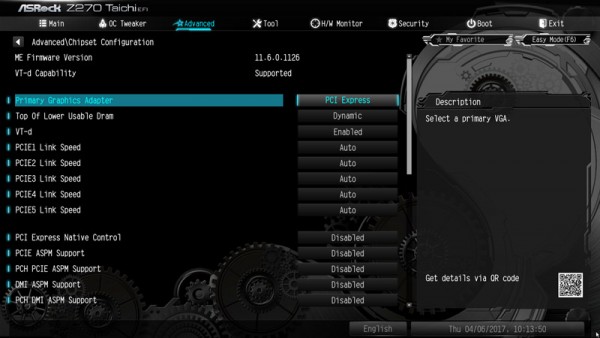
Manual deactivation of each individual USB ports is also possible.
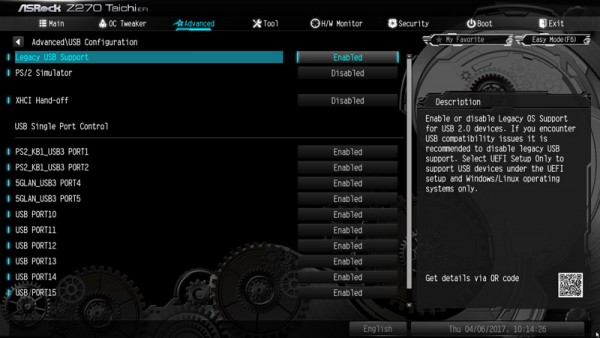
Fan control …
The UEFI Setup of the passive cooled Z270 Taichi motherboard offers extensive temperature fan control options for 4-pin or 3-pin CPU fans. The settings for the fan controller can be found in H/W Monitor directly below the temperature und voltage display.
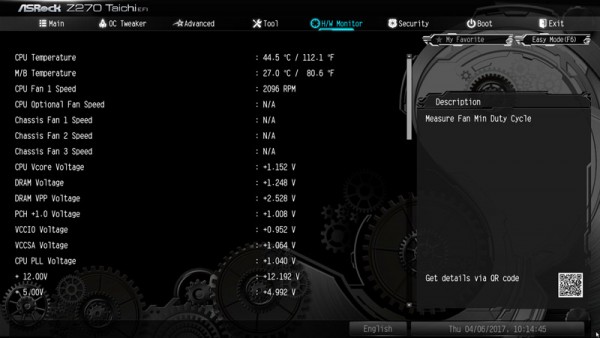
Here are settings for the CPU Fans, both chassis fans and chassis fan 3 or W_Pump switch. There is also a selection of time to raise and lower the fan speed and the motherboard automatically detects if a 4-pin fan or a 3-pin fan is connected at the 4-pin chassis fan connector and fits the type of control (PWM or analog) accordingly to.
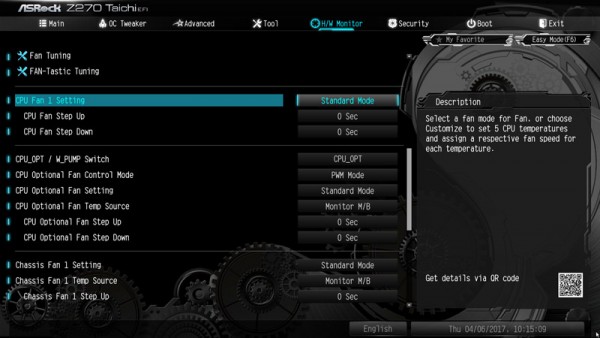
You have the choice between Customize, Silent, Standard, Performance and Full Speed. In Customize mode are several temperature steps available to assign a certain fan speed.
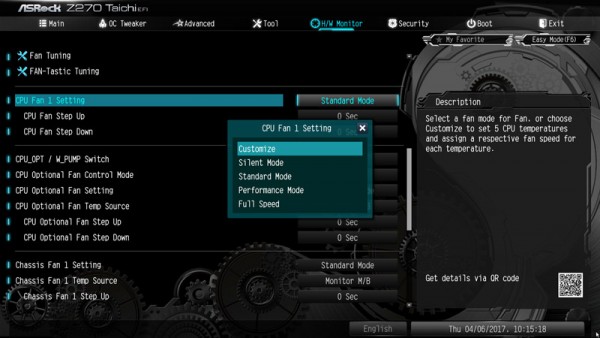
Here you can see the settings of the fan controller and the time settings to increase or lower the fan speed.
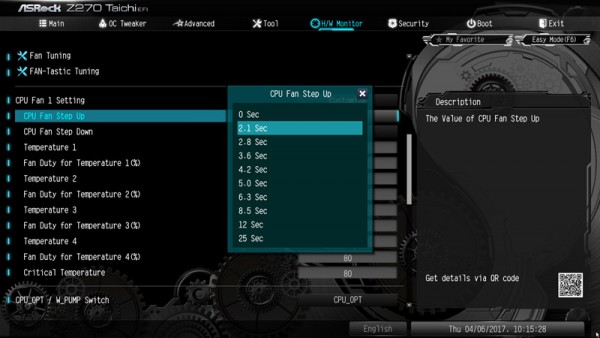
Now, you can adjust the speed to the temperature in several steps.
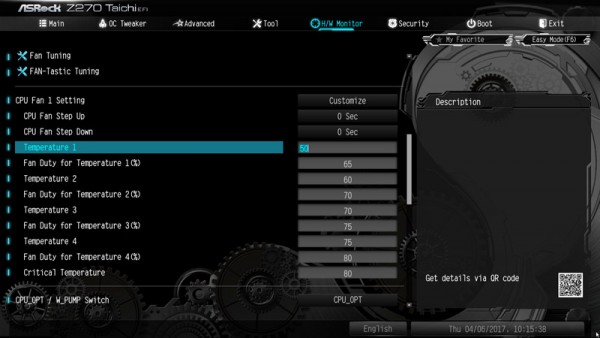
Since the announcement of X99 motherboards, ASRock has even implemented a graphical interface in the UEFI setup for controlling the fans. You can find the FAN-Tastic Tuning menu also in the H/W monitor and thus can make all the settings very clearly. Simply select the respective fan connector on the left and select the mode on the right side – e.g. Performance.
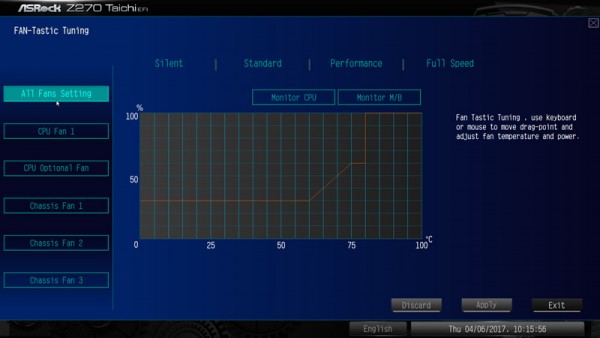
In Customize mode, you can set all values directly in the chart and save.
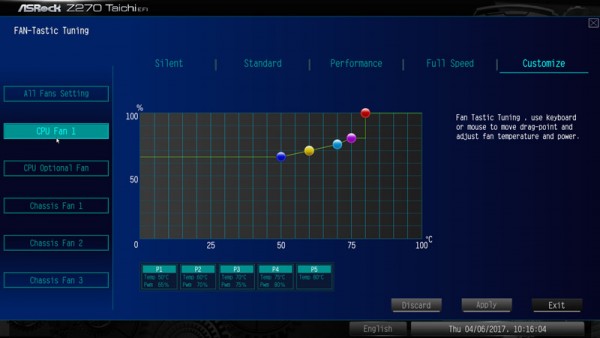
For the chassis fan connectors you can even select, which source you want to use for temperature measurement – Monitor CPU or Monitor Motherboard. Then click on apply and save the values.
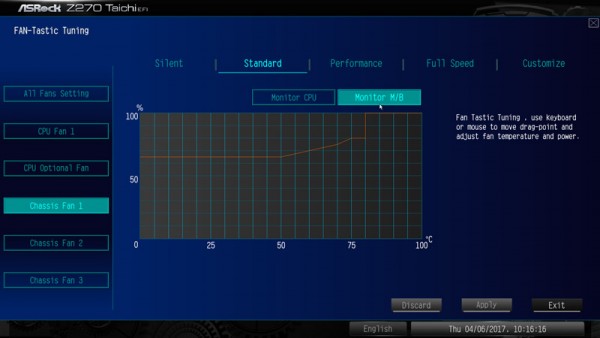
You can usually get along without an expensive Fan Controller, because the fans are controlled with this fan control based on CPU or motherboard temperature. And even on a control of the 3-pin chassis fan was thought.
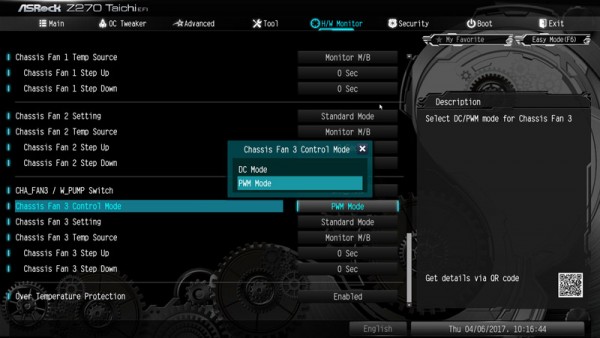
Wenn alles eingestellt ist, einfach wie gehabt mit der F10 Taste abspeichern und mit Z bestätigen.
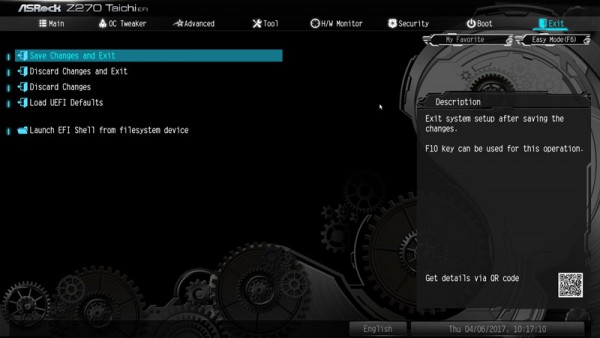
ASRock Z270 Taichi energy consumption …


